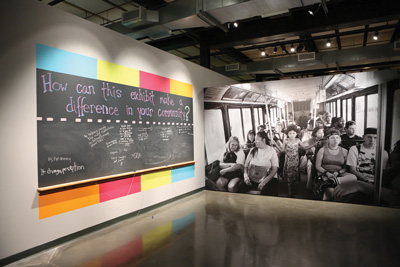Bridges
Permanent link All Posts
Entrance to the "RACE: Are We So Different?" exhibit now showing at the Illinois Holocaust Museum & Education Center. Photo credit: Ron Gould Studios
It's a new year, full of hopes and dreams—dreams like the one Dr. Martin Luther King Jr. spoke about all those years ago.
In the last two months, one thing we've learned is that we have a long way to go before we shall overcome. No matter what happened in the moments leading up to the deaths of Michael Brown, Eric Garner, Tamir Rice, and others, their tragic losses have re-opened our eyes to the difficult, polarizing way our nation wrestles with issues of race.
At the same time, we should take pride in our progress. Our country has elected its first black president, an event our grandparents never thought they'd live to see. And the Martin Luther King Jr. Memorial now graces the Mall of Washington.
Yet the racial prejudice and injustice that haunt our history persists, confronting us with a new paradox. More than 50 years after Dr. Martin Luther King Jr.'s "I have a dream" speech, even as Barack Obama has occupied the highest office in the land for almost six years, racism—we know—pervades.
Two recent polls—commissioned by the Associated Press—suggest that racism has gotten worse in this country since Obama entered office. The surveys find that the number of Americans who harbor "explicit anti-black attitudes" rose to 51 percent in 2012 from 48 percent in 2008, while implicit anti-black attitudes increased from 49 to 56 percent.
In terms of black/Jewish relations, we sometimes forget the common ground our communities share. Dating back to slavery in the United States, African Americans drew inspiration from the Jewish exodus to freedom, and our two peoples share long histories of oppression as well as achievements, and important partnerships.
In the 1900s, Jewish and African-American leaders worked together to form the National Association for the Advancement of Colored People (NAACP) and the Urban League. Later, during the Civil Rights Movement, Jews marched alongside their black brethren. Heroes like Andrew Goodman and Michael Schwerner, both Jewish, and James Early Chaney, an African American, were killed during the "Freedom Summer" of 1964 trying to help African Americans register to vote.
Today, the Jewish community carries on the legacy of facilitating conversation between our two communities. JUF's Jewish Community Relations Council strengthens ties with other groups in Chicago, including the African-American, Latino, and other faith communities through programming and meaningful individual and institutional relationships.
With the hot topic of race front and center in the news, I recently visited the "Race: Are We So Different?" exhibit, currently showing at the Illinois Holocaust Museum & Education Center (IHMEC) in Skokie.
The exhibit confronts race and racism and tells the story of race from a biological, cultural, and historical point of view.
It's fitting that the exhibit is running at the IHMEC because the Holocaust is the ultimate example of what can go terribly wrong when people start to use their differences to justify hate against one another.
The exhibit explores race as a social construct, and conveys a sense that white people, even if not "racist," have benefited from a racist system in this country that offers privileges to white people.
In a video interview at the exhibit, an interracial couple—a black woman and a white man—talk about their marriage, how they are viewed from the outside, and what it's like to raise a biracial daughter, who doesn't fit neatly into one box on the U.S. Census form. In the video, the woman says that racism will only start to melt away as people of different backgrounds "get to know each other," she said. "That's the bridge."
God knows we have a long way to go to combat racism and other forms of bigotry. But we as individuals can do our part in baby steps. As we pay tribute to Dr. King's legacy this month, and honor our shared history and sacrifice in the pursuit of justice for all, let's build bridges and get to know people from different backgrounds.
Only then will we discover how much we are alike.
Come celebrate Dr. King's legacy on Jan.19, at 10:30 a.m. as JUF joins with Stone Temple Baptist Church, The Firehouse Community Arts Center, Sinai Health System and the North Lawndale Historical and Cultural Society to reflect on Dr. King's legacy and the relationship between the Jewish and African-American communities. The celebration will be held at Stone Temple Baptist Church, 3622 W. Douglas Boulevard, Chicago, IL 60623 and transportation will be provided from the JUF Building, 30. S. Wells St., Chicago, IL 60606. For more information and to register, contact JCRC1@juf.org or (312) 357-4770.
The "Race: Are We So Different?" exhibit runs at the IHMEC through Jan. 25. For more information, visit www.ilholocaustmuseum.org/pages/exhibitions/special-exhibitions. The Illinois Holocaust Museum and Education Center is a special grantee of the Jewish Federation of Metropolitan Chicago.



.jpg)



